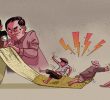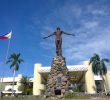Beating the Odds
This lack of understanding is reflected in the aforementioned 10-point poverty alleviation strategy, which instead of addressing the roots of poverty, hews to the foreign investment-driven strategy Arroyo has been pursing since she came into power.
Beat the Odds is an acronym that stands for: a balanced budget; education for all; automated elections; transport and digital infrastructure to link the country; terminating hostilities with the New People�s Army and the Moro Islamic Liberation Front; healing the wounds of EDSA; electricity and water for all barangays; opportunities to create six to eight million jobs; decongest Metro Manila through the decentralization of government offices and new transport infrastructure systems; develop Subic and Clark as globally competitive logistic hubs in partnership with the private sector.
A closer examination of these strategies reveals that, devoid of a genuine national development strategy that addresses the country�s lack of industrialization and agricultural backwardness, they will not alleviate poverty and will even worsen it.
Take, for example, the goal to achieve a balanced budget. Economic planners recently announced that, with the declining budget surpluses, government might reach its goal by next year. And indeed, the Arroyo government�s budget surplus has fallen from a peak of P816.2 billion in 2005 to P62 billion last year.
But government achieved this by squeezing Filipinos through the double whammy of higher taxes and declining spending on social services. The most onerous of these taxes is the reformed value-added tax (RVAT), if only because of its sheer regressive nature. The RVAT increased the VAT rate from 10% to 12% and removed exemptions on gas and electricity. As a result, the tax generated P77 billion in net revenues in 2006, mostly by increasing the prices of basic goods and services.
Meanwhile, even as government was busy counting tax revenues, it failed to deliver social payback to Filipinos in the form of increased basic services. Real spending per capita on education of P1,508 in 2006 is 22% lower than when Arroyo came into office in 2001, per capita health spending of P159 is 25% lower and on social security, welfare and employment of P532, 9% lower.
Thus, it should not be surprising that government is far from its stated goal of providing �education for all�. Millions of Filipino children, in fact, are unable to obtain a decent education. Of every 100 children who enter Grade 1, only 66% will finish elementary school, 43% high school and 14% college. As a consequence, in 2006, some 2.5 million children aged 5 to 17 were working either to augment their family�s incomes or to survive on their own.
Creating transport and digital infrastructure between the country�s islands also sounds like a laudable goal. But given such problems as widespread poverty in the countryside, and overall low computer ownership in the country (only some 2 out of every 100 Filipinos owns a computer) such infrastructure development may be designed primarily attract foreign investors such as agri-business enterprises and business process outsourcers.
The government�s stated goal of �opportunities� to create six to eight million jobs also seems doubtful, given the absence of a national industrialization program or moves to address problems of peasants in the countryside. It seems clear that the Arroyo government will once again rely on foreign investors for job creation even if decades of foreign direct investments coming in have not contributed substantially to solving the employment crisis in the Philippines. In this context, it should not be surprising that the president has continuously reiterated her intention to pursue the removal of economic sovereignty provisions in the current constitution, even in the face of widespread public disapproval of such moves.
Clash of elite
When IBON Features asked Bong why he believed that elections would not bring about change, he wisely replied, �Ganoon pa rin yung nakaupo� (Those in power are still the same people)�.
His reply showed a discerning grasp of what elections in the Philippines are all about, namely a clash of various elite factions. Whichever group wins, administration, opposition or even independent, it is still the interests of the local and foreign elite that will be promoted over those of the poor Filipinos who make up the majority of the population. Elections in the Philippines will not bring about the kind of fundamental economic and social changes that the country badly needs to truly progress.
That said, the upcoming polls are still viewed as a referendum on the performance of the Arroyo government. And with the consistent majority win of opposition bets predicted in various surveys, it seems that voters are set to reject Arroyo, if only because they see that her policies have only worsened their lives over the past six years. (IBON Features) davaotoday.com
2007 Elections, Poverty









